Food is one of the most significant expenses that we have in our lives. It comes in at number three behind housing costs (£10,440 per year) and transportation costs (£3,462 per year). That’s why one of the things to consider when working towards financial independence is food. Luckily, grocery shopping doesn’t always have to be expensive, and there are ways to cut your food expenses while still getting all the nutrients you need.
How Much Does the Average Person Spend on Food Per Week UK?
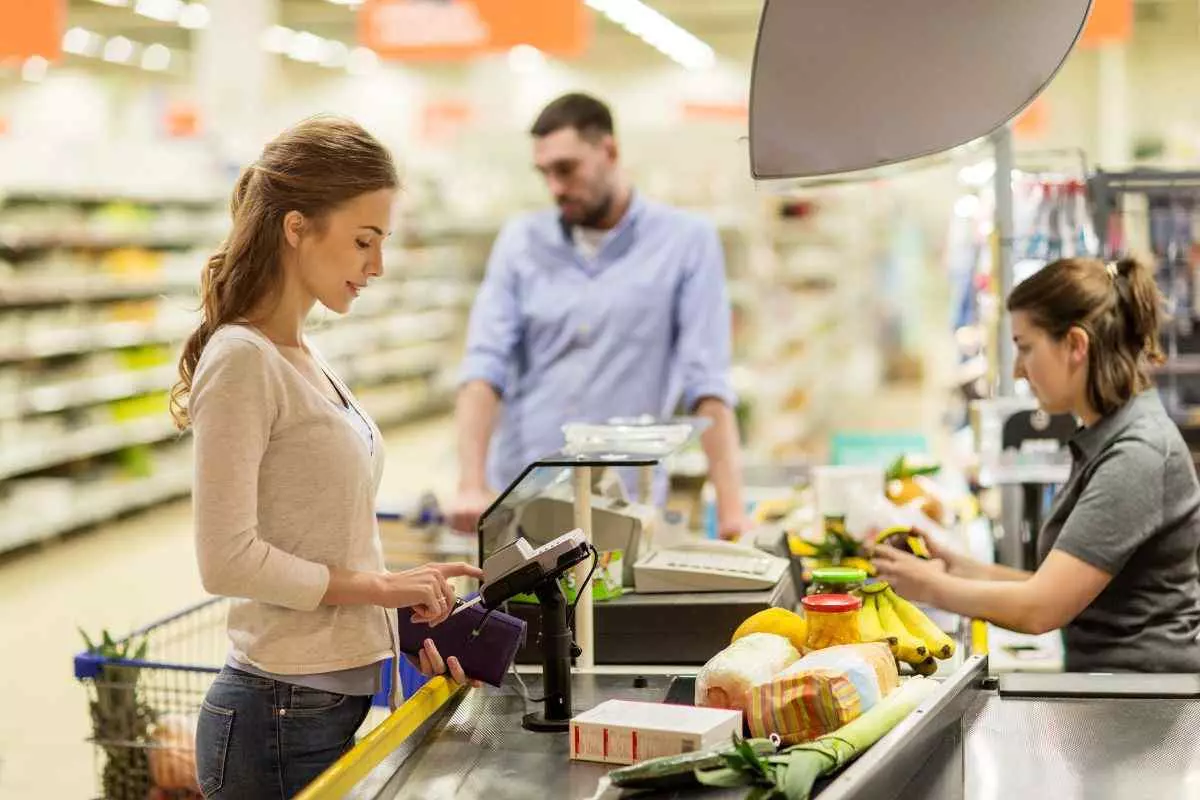
A study done by NimbleFins showed that the average person in the UK spends around £2,095.60 shopping for food every year. That makes the average food cost per month in the UK around £174.63, which means that a single-person food budget in the UK costs £40.30 per week. Out of the £40.30, £26.50 is spent on grocery shopping and £13.80 on food out every week. This means around £114.80 is spent on food shopping every month and £59.80 on takeout and restaurant meals.
Of course, these numbers vary depending on the person’s lifestyle and caloric needs. These numbers also go across different income groups. As a person’s income rises, their weekly food and drink budget also increases. The highest-earning households spend three times more than the lowest-earning families on food and alcoholic drinks. The highest-earning households spend more money on fresh fruits and vegetables than lower-earning households, who spend more of their monthly food budget on processed meats and milk.
Also, the lowest-income families spend 21% of their total household budget on food and drinks, which takes the highest proportion. They prepare their meals at home and pay only 25% of their food and drink budget to eat outside. On the other hand, wealthier families spend 44% of their food and drink budget dining outside and ordering takeaways.
What Food Does the Average UK Household Spend the Most Money on?
The study also showed that the average UK household spends most of its budget, £343 a year, on processed meat such as sausages, ham, and bacon. Non-alcoholic drinks come second with £276 a year. Then comes fresh vegetables at £234 per year. Cakes, buns, and biscuits come in third place at £213 per year, whereas fresh fruits come in fourth with £208 per year. The total weekly food budget of a household in the UK is £63.70, or £3,312 yearly.
How to Save Money on Food UK
You can’t survive without eating, but there are many ways you can save money on food while grocery shopping. Consider the following tips the next time you go shopping for food on a single-person food budget in the UK.
Shop at Cheaper Stores
Instead of going shopping at markets specializing in premium foods, go to more affordable stores. Shopping at low-price stores is extremely helpful if you are trying to save money on food.
Meal Plan
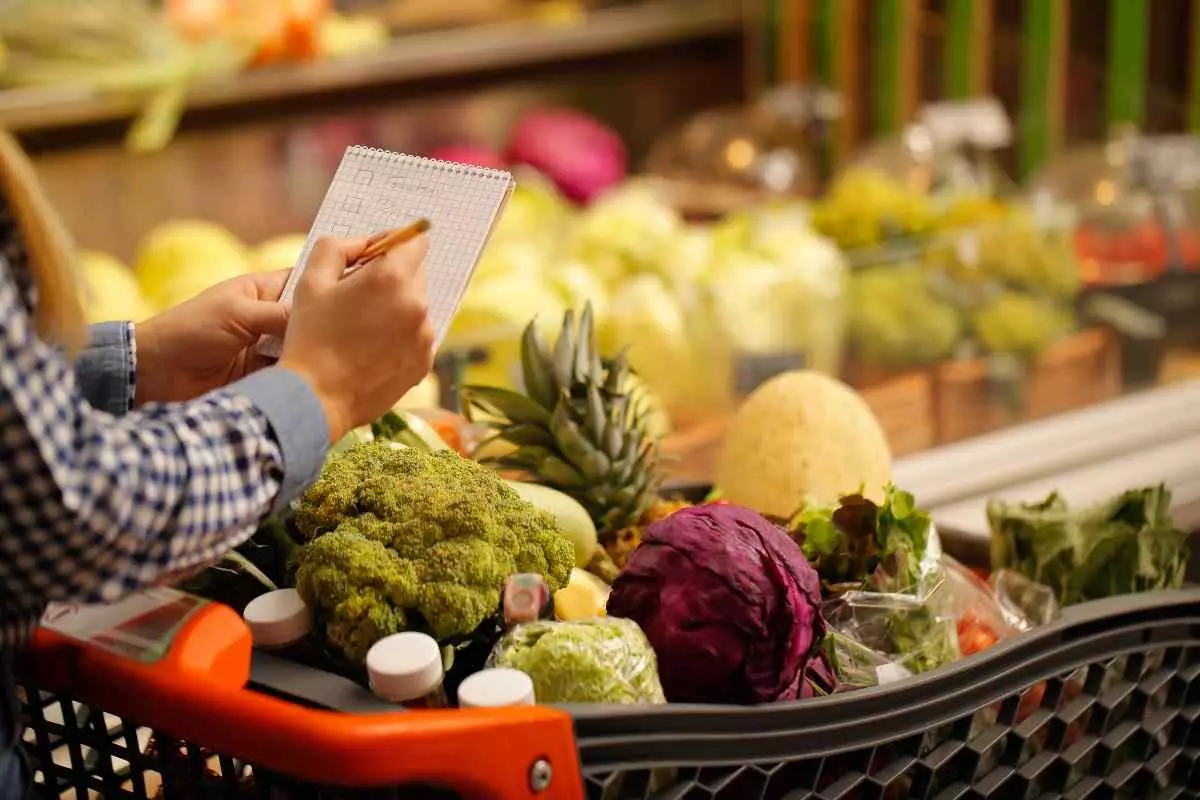
Before you go to the grocery store:
- Plan out your meals for the week.
- Write down what you are going to eat for breakfast, lunch, and dinner.
- Don’t forget to write down your snacks.
- Break down every single meal into ingredients and make a list of things you need to buy.
Check Your Pantries
After breaking down every meal, make sure to check your cupboards, fridge, and freezer. Doing so will help you avoid buying extra food and spending money on something you already have but didn’t know.
Have a Shopping List
Make a shopping list of what you need to purchase at the grocery store. Having a list not only reminds you about what you need to buy and helps you stay on track with your weekly budget, but it also saves you time at the grocery store.
Use Cash
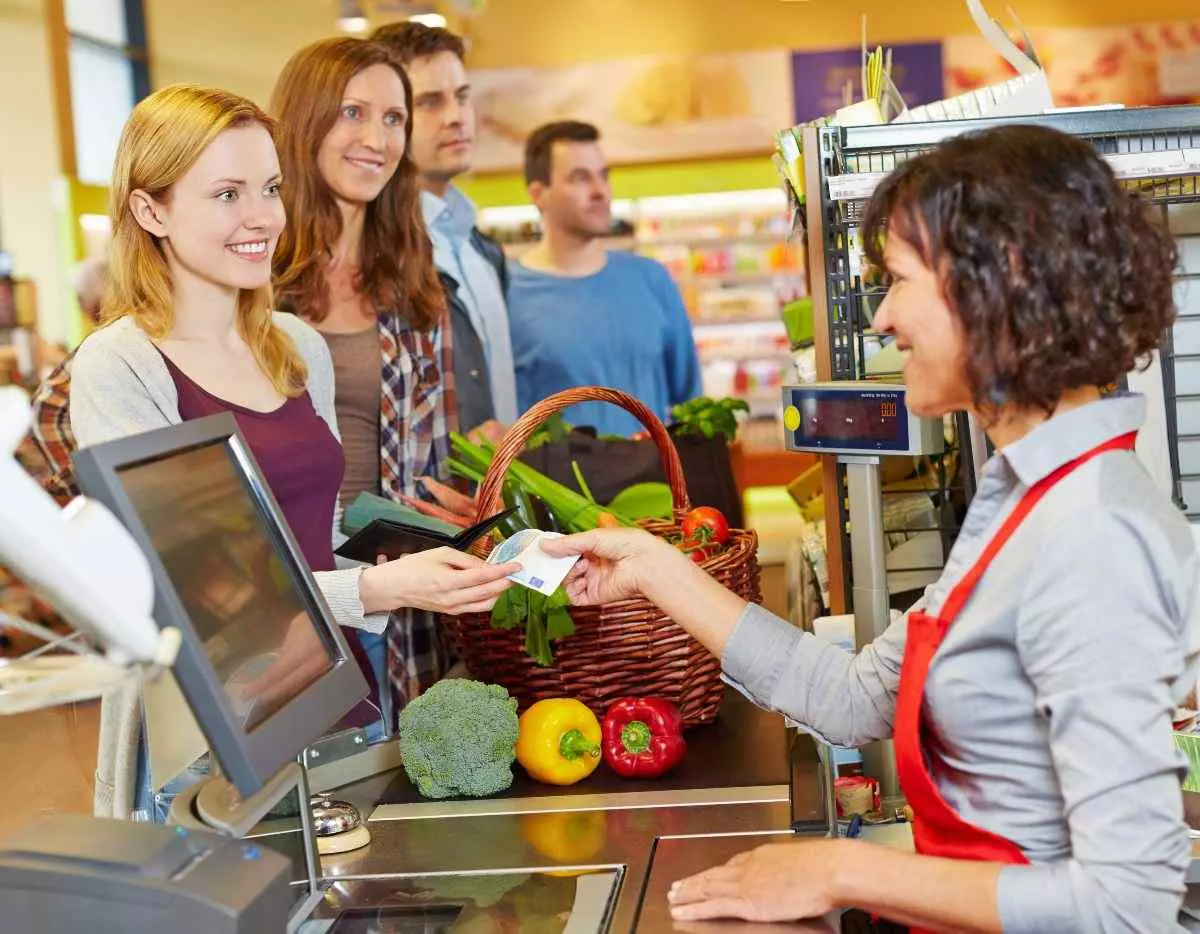
Take cash with you to the grocery store. This way, you can’t overspend by accident. For example, if your weekly single-person food budget in the UK is £25, have four envelopes in your drawer, one for each week of the month. Put £25 inside each envelope. This way, you don’t have access to more than what you have budgeted on food and keep track of your budget.
Buy Loose Produce Without Packaging
When buying produce, keep in mind that produce that comes inside a bag is almost 50% more expensive than the ones that aren’t packaged. You will end up spending money on unnecessary wrapping.
Don’t Buy Prechopped Fruits and Vegetables
Prechopped fruits and vegetables are more convenient but come at a higher price. Unless you find something that is discounted, opt for the cheapest format and chop your fruits and vegetables at home. This will help you save money.
Be Mindful of Brands
Skip the name brand; get a generic one instead. Chances are they all taste the same but have different labels. By purchasing the name brand, you pay more for product testing, advertising, and a pretty label.
Check the Bottom Shelves

Expensive products are placed at eye level because they are the most expensive options. Therefore, look at the bottom shelves to find the exact item you are looking for at a lower price.
Reach the Back of the Shelf
To get the freshest items, such as milk, yogurt, and cheese, reach way in the back of the shelf. However, keep in mind that if you will use the product before the expiry date, buy the ones that are placed at the front because if everyone purchases the items in the back, many products will go bad, be thrown out, cause prices to go up, and create more food waste.
Buy Frozen or Seasonal Fruits and Vegetables
Frozen fruits and vegetables are generally less expensive than fresh produce but just as nutritious. If going with fresh options, buy fruits and vegetables depending on the season because seasonal fruits and vegetables are relatively cheaper because of the abundance of crops.
Buy Discounted Meat Products
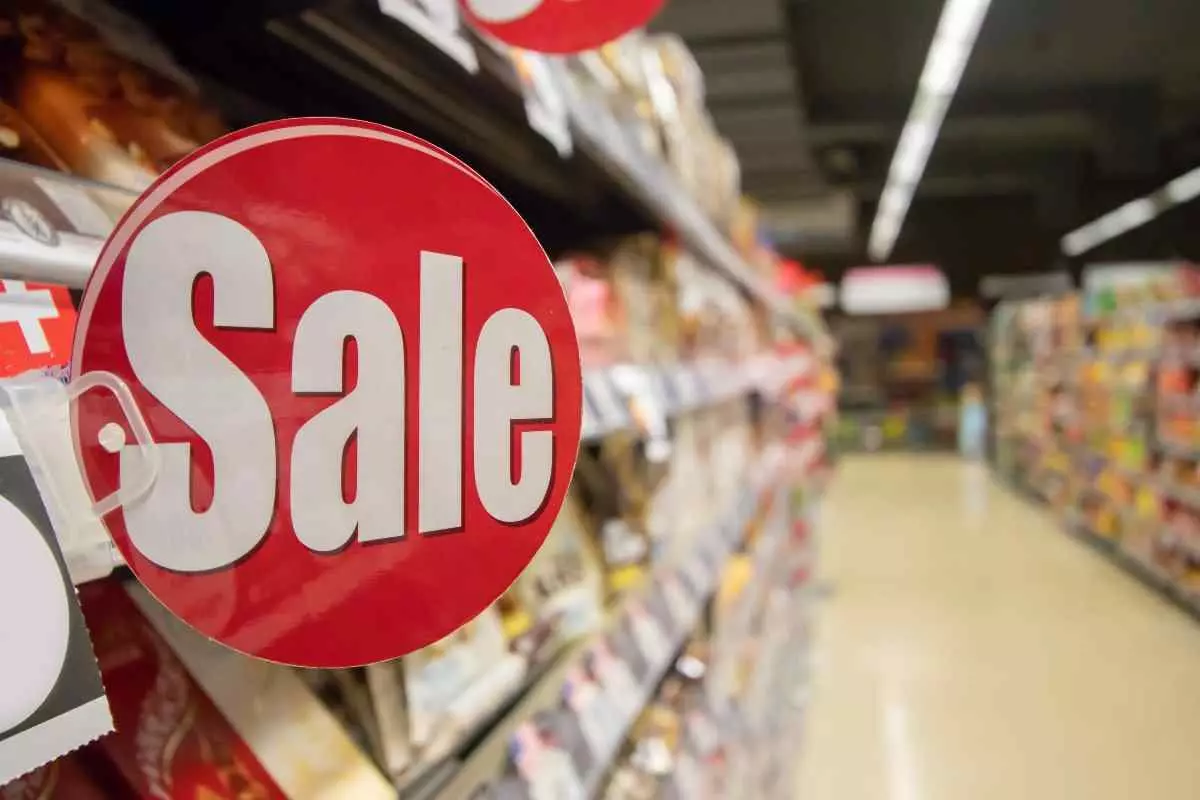
If you want to buy good quality meat at a reduced price, buy the ones getting close to the sell-by date. This doesn’t mean that the meat will go bad after the sell-by date but use it within a couple of days or store it in the freezer. Doing this will help you save around £4 per week.
Opt for Plant-Based Protein Sources
When trying to cut down your food budget, try to substitute meat with plant-based protein sources such as beans, lentils, and chickpeas. They are relatively much cheaper and budget friendly. Buying less meat will help you save around £25 on your monthly grocery bill.
Download the Grocery Store’s Mobile App
If your grocery store has a mobile application, download it for coupons, deals, and cashback offers. This may also help you cut down your gas bill, as some stores offer savings at the pump.
Use Your Calculator

To ensure that you stay within a single-person food budget in the UK while shopping, use the calculator on your phone to add your groceries up. Seeing the price before you check out will help you avoid going over your budget before it’s too late. Using your calculator will also help you identify any incorrect charges at checkout.
Cut Down on Alcohol
If you enjoy having a drink every other day or once a week, instead of buying one bottle of wine or a pack of beer every week, get it every other week. This will help you save around £34 every month.
Cut Down on Bread
Instead of buying bread every day to eat with your lunch, use things you already have in your pantry, like rice or quinoa. This will reduce around £10 on your total monthly bill.
Buy in Bulk and Batch Cook
Buy in bulk whenever there is a sale, batch cook them, and store them in your freezer. But if you are not sure that you will consume all of it before the expiration date, refrain from buying in bulk.
How Much Should You Budget for Food Each Month?
The most effective way to decide how much you should budget for food each month is by keeping track of all your past grocery expenses. You can either keep your receipts and add them up or use a budgeting app.
Examine what you have purchased in the past and what was necessary. Can it be replaced with a more affordable option or eliminated? A detailed grocery audit will help you realize if you are buying many brand foods or making impulse purchases.
Don’t rely on your memory. Instead, keep a record of your spending to help you with your single-person food budget in the UK.
More Ways to Save Money on Food
Eating healthy is a priority and should not be compromised when trying to save money on food. Below are five tricks that you can use to save some money while still maintaining a healthy lifestyle. If you are short on cash until your next paycheck, you can apply for high acceptance loans to get your groceries.
Do More Cooking at Home and Pack Your Lunch
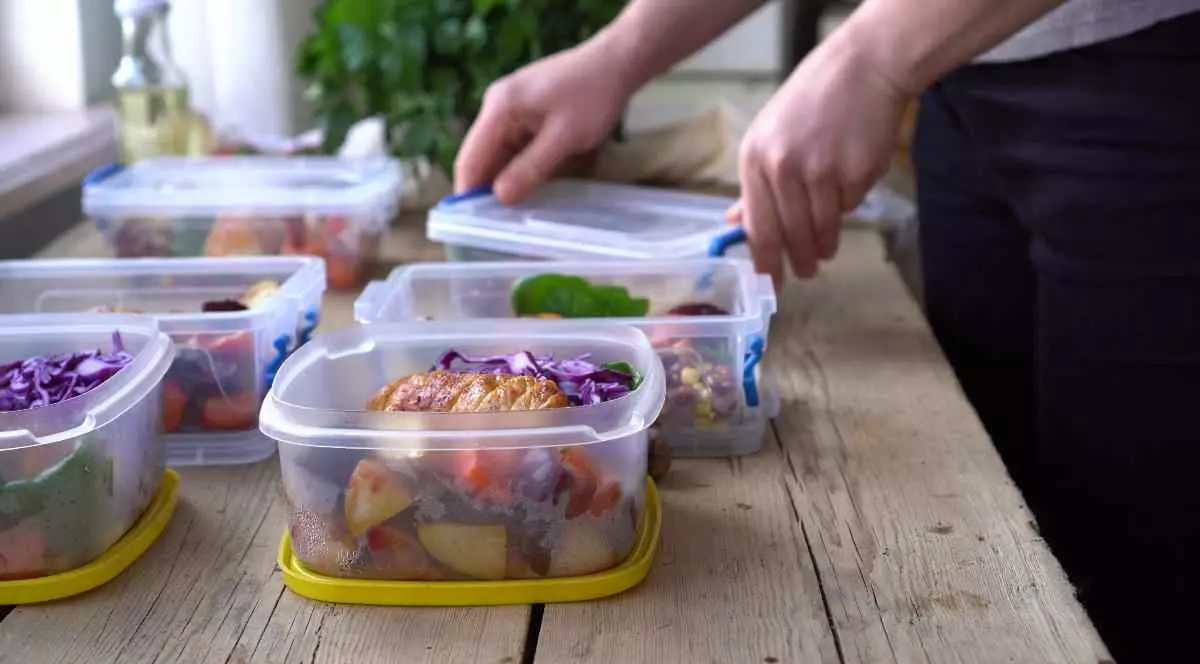
Ordering food and dining at restaurants costs around four times more than what it would have costed if you cooked the same meal at home. The same applies to ordering drinks from coffee shops instead of bringing your coffee. Packing your lunch and coffee can save you more than £2,000 in a year.
Cook Meals that Require the Same Ingredients
Let’s consider that you already have the following staple ingredients in your pantry: rice, pasta, potato, tomato, onion, garlic, seasonings, and butter. From the grocery store, you buy a chicken for £3.50, a bag of frozen vegetables for £1, cheese for £2, and eggs for £1. By using what you already have at home and the items that you bought, you can cook five different meals that require the same ingredients:
- Chicken and pea risotto using chicken, rice, and vegetables
- Chicken and potato pie using chicken, eggs, potato, and vegetables
- Chicken and tomato pasta using chicken, pasta, cheese, and tomato
- Cheese and onion frittata using potato, eggs, cheese, and vegetables
- Chicken and vegetable pilaf using chicken, vegetables, and rice
Buying ingredients that you can utilize in multiple dishes will help you save money and minimize food waste.
Repurpose Leftovers
If you are left with tons of leftovers, repurpose them instead of throwing your money in the trash. If you have leftover vegetables that will go bad if you don’t use them quickly, make a soup out of them. You can also add some leftover chicken in the soup to add some protein. You can also prepare at-home vegetable or bone broth using your leftover veggies or chicken bones. If you like snacking on pickles, you can also pickle your leftover vegetables in apple cider vinegar.
If you have a loaf of bread that has hardened, instead of throwing it in the trash bin, dry them in the oven to make homemade croutons or bread crumbs. You can also prepare French toast by soaking the bread in a whisked egg.
Store Your Products Properly
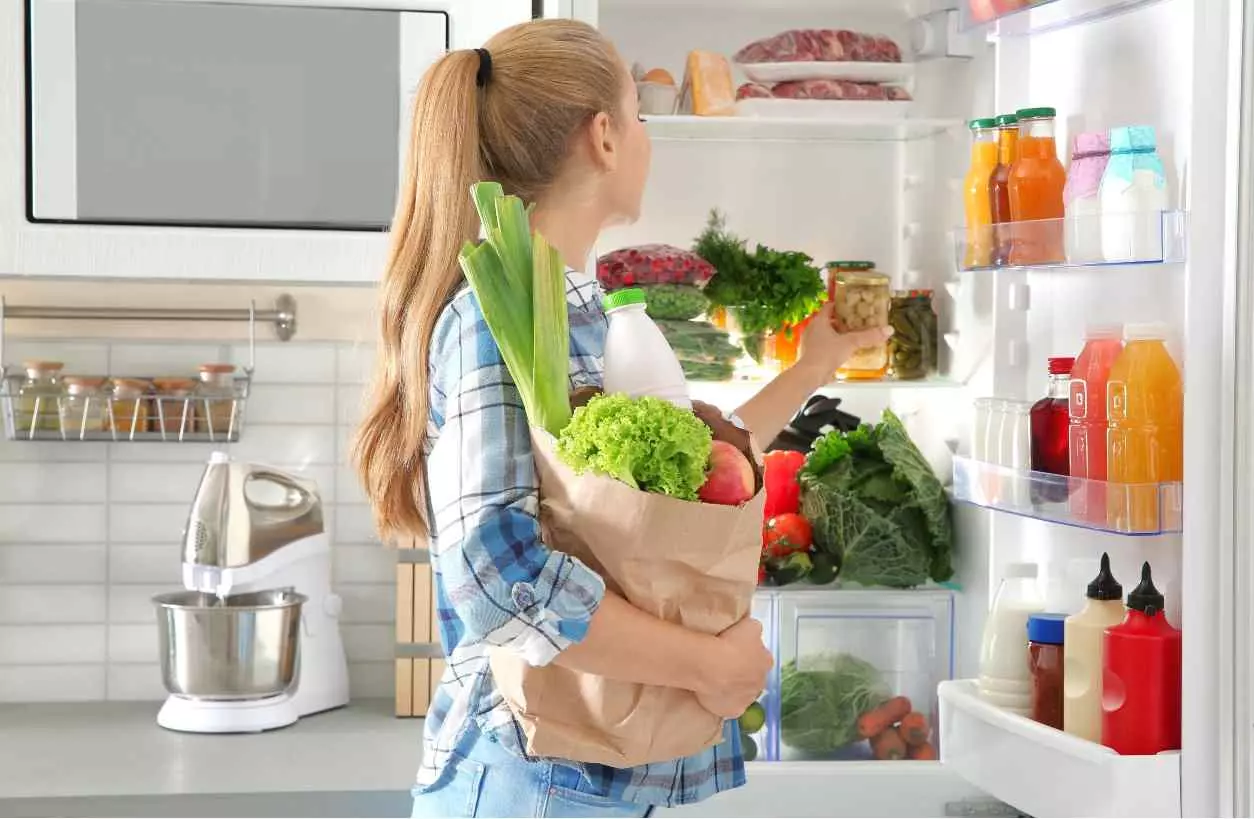
To make your produce last and not waste money, you need to know how to store them properly.
- Berries are prone to mold quicker than other fruits. As soon as you get them, wash the berries in a solution of water and vinegar to prevent molding. Make sure to rinse them well to clean all the vinegar. Place a dry paper towel at the bottom of the container and store the berries in the fridge. Also, eat your berries earlier than other fruits such as apples, oranges, and bananas because they take longer to ripen.
- Cucumbers, zucchinis, and bell pepper do the best in the drawers. Store them unwashed because the moisture can make them ripen faster. Instead, wash before use.
- You must store squashes, mangos, cherry tomatoes, and avocados on the countertop of your kitchen. If they are ripe, but you will not eat them soon, then store them in the fridge.
- Cut the end of herbs such as cilantro and tarragon, store them in a mason jar filled with water, and place them in the fridge. This will extend their shelf life by many days.
- Store asparagus the same way as herbs. Trim the edges and store them upright in a mason jar or a glass of water.
- Wrap celery in foil and store it in the fridge. Never wrap them in a plastic bag because it will trap ethylene gasses that make them go bad faster.
- Store potatoes and onions separately in a cool, dark place. When stored together, they produce gases that can harm each other.
- Place raw meat, fish, and poultry at the bottom shelf of your fridge because it is the coldest. Use the middle rack to store eggs.
- Put your dairy and pre-cooked meals at the top shelf because it has the most consistent temperature. To prevent your cheese from drying out, wrap it in a resealable bag, then store it in a plastic tube.
Shop Weekly, Not Daily
Most of us end up throwing a few extra items in the cart when we shop. This can be a significant problem when you visit the store every day. On the other hand, weekly shopping gives you fewer chances to waste your money, and it offers more opportunities for planning out meals. Shopping once a month can save you even more, but it’s a lot harder to ensure that you will have fresh fruits and vegetables.
Don’t Go Grocery Shopping on an Empty Stomach
Even if you have your shopping list prepared and cash in your hand, going grocery shopping on an empty stomach will tempt you to buy things that you don’t need and spend more than what you have budgeted.
Conclusion
Budgeting and spending less money on food and drink may be easier when you have a specific goal in mind for what you will do with the amount you want to save. Consider investing your money or starting your own small business. You can always get a small business loan whenever you are short on cash and work towards financial independence.